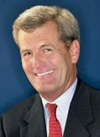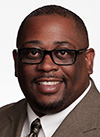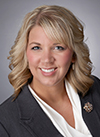
Jan. 4, 2017 – New Year’s resolutions. If only we could keep our resolve to eat better, exercise more, be more organized, work more efficiently, improve productivity, save money, or quit bad habits that interfere with our ultimate goals.
More often, these good intentions fade quickly. According to one study, almost half of Americans make New Year’s resolutions but only 8 percent are successful. Less than half of that 8 percent maintain their resolutions for more than six months.
But if you really want to make some changes this year, consider some tips to maintain your resolutions despite the odds. For instance, the American Psychological Association (APA) says people should start small and change one behavior at a time.
“Replacing unhealthy behaviors with healthy ones requires time,” the APA notes in an article on the APA website. “Don’t get overwhelmed and think that you have to reassess everything in your life. Instead, work toward changing one thing at a time.”
The article notes that you don’t have to throw your resolutions out the window if you get off track. “Remember that minor missteps when reaching your goals are completely normal and OK … resolve to recover from your mistakes and get back on track.”
Different Approaches
Others in the behavioral health and economics fields have studied the issue of New Year’s resolutions and how to influence human behavior related to long-term goals.
 Michael F. Moore, Lewis and Clark 1983, is a professional coach for lawyers and founder of Moore’s Law, Milwaukee. He has more than 25 years’ experience in private practice, as a general counsel, in law firm management, and in legal recruiting.
Michael F. Moore, Lewis and Clark 1983, is a professional coach for lawyers and founder of Moore’s Law, Milwaukee. He has more than 25 years’ experience in private practice, as a general counsel, in law firm management, and in legal recruiting.
For instance, two studies on weight loss and smoking found that participants were more likely to maintain their goals if they had a financial stake in the ultimate outcome. Participants set aside money they would lose if they did not meet their goals.
Another study highlighted success for people who bundled temptations. For example, you can only watch reruns of L.A. Law or Night Court while exercising at the gym. Finally, experts seem to agree that achieving goals is easier when you have support.
I agree, especially when making professional goals. Accountability is key. When you know someone will ask about your progress – especially a mentor whom you admire and respect – you are bound to increase your chances of successfully meeting your goals.
“Moore” Tips to Keep Your Professional Resolutions in 2017
I have my own New Year’s Resolution as a lawyer-coach: adding one new client in Wisconsin, one in Chicago, and one in another major American city. Like any resolution or goal, I will improve my likelihood of success with a specific plan and a strategy.
My strategy includes teaching at the State Bar of Wisconsin’s G. Lane Ware Leadership Academy, following up on a referral from a current Chicago client, and presenting for a second time to law firms in Pittsburg on succession planning. I have other goals to help my clients overcome obstacles in reaching their personal development plans, too.
Following the steps below will certainly be in my plan-of-attack this year. I hope these tips can help other lawyers keep their resolutions in 2017 and beyond. Good luck!
Need a Resolution and a Strategy?
Sample Resolution #1: Increase Client Development Activities
Client development has often included more trial and error than analysis. Frequently, lawyers simply trust their networks of personal relationships and the word-of-mouth referrals that have worked in the past. These techniques may produce some results, but in today’s hyper-competitive market for new clients, there are more effective methods.
Start by setting personal objectives that are realistic and achievable. For example, “Add five new contacts within the next six weeks.” Your strategies will, therefore, include learning how to work a room, creating a relevant elevator speech, and expanding your use of social media. Your primary tactics require actually attending networking events and applying your new knowledge. Your secondary tactics will then include following up on any relevant leads within two weeks of the event.
Sample Resolution #2: Improve Personal Productivity
Personal effective time management increases our individual productivity, improves our client service, and creates options for an improved work/life balance. We can be more effective at everything we do.
Your objectives will include the adoption of specific time management techniques. Your strategies should focus on shortening the cycle time from work in process to billing to payment. Tactical activities will, therefore, include entering time daily, getting bills out in a timely fashion, and collecting receivables promptly.
In this knowledge-based digital age, most of us suffer from information overload. One of my common challenges to personal productivity is to stay focused on the specific things I need to get done on a given day. On most days there are many unexpected new activities that arise to alter my plans. Therefore, each night I make a list of all my activities expected for the next business day. I make another list of all phone calls I hope to make the next business day. If my activities require me to be with a client all day (coaching lawyers or working on a project, for example), then I know I will have limited time to make phone calls. On the other hand, if I will be traveling from client to client or activity to activity during the day, I know I can catch up on my phone call list.
1. Make a Plan
Creating a personal strategic plan helps you organize your time, maximize your resources, and make the most of your activities. Following a plan focused precisely on what you want to achieve allows you to concentrate your efforts. You can measure your progress and raise your self-confidence.
2. Set Goals, Objectives, Strategies, and Tactics
Effective plans should include goals, objectives, strategies, and tactics. Your goals should be a simple statement of what you want to get done. For example, “Add one new business client.” Now you will need objectives which are the milestones by which you measure your progress toward achieving your goal.
In this example, that might be as simple as adding a time deadline: “Add one new business client within three months.” You have narrowed your focus and removed ambiguity. Now you can measure your progress toward your goal each month.
3. Create Linkage between Strategies and Tactics
Strategies are the methods by which you will meet your objectives. For example, “Write a business law article, speak at a conference for business owners, and meet five new potential business clients and turn one of these into an active client.”
You have transformed “Add one new business client within the next three months” into specific strategies to be achieved within each of your monthly objectives. Tactics are the resulting specific activities required to execute the strategies you have developed. In this example, actually getting the article published, speaking at the conference, and developing the leads are all tactical activities.
4. Make New Year’s Resolutions Part of Your Personal Success
Practicing law is one of the most demanding professions and the struggle to succeed can be overwhelming. New Year’s resolutions can be an effective method to help you assess your strengths, set goals, and stay on track. Creating a personal strategic plan allows you to focus precisely on what you want to get done and helps you concentrate your efforts. Measuring your progress raises your self-confidence. By choosing where you want to go and creating a detailed plan of action focused on realistic, achievable objectives your chance of success increases exponentially.
What’s Your New Year’s Resolution?
We asked some Wisconsin lawyers and judges about their New Year’s resolutions for 2017. Here are some of their responses. Post your own resolutions in the comments below, or email us at insidetrack@wisbar.org!
Michelle Behnke: Practice Mindfulness
 “Mindfulness can help creativity and effectiveness, and improve health and well-being,” said Michelle Behnke of Michelle Behnke & Associates in Madison. A former president of the State Bar, Behnke will also become the ABA’s treasurer in August. “Helping clients day to day can create high stress and result in you moving through each day rotely. Soon, you don't even know when you are not being present in the moment. You can be far more effective if you give yourself a chance to recharge. Taking even 15-20 minutes each day to refocus will change how you do things and help you be a better person and lawyer.”
“Mindfulness can help creativity and effectiveness, and improve health and well-being,” said Michelle Behnke of Michelle Behnke & Associates in Madison. A former president of the State Bar, Behnke will also become the ABA’s treasurer in August. “Helping clients day to day can create high stress and result in you moving through each day rotely. Soon, you don't even know when you are not being present in the moment. You can be far more effective if you give yourself a chance to recharge. Taking even 15-20 minutes each day to refocus will change how you do things and help you be a better person and lawyer.”
Fran Deisinger: Meet other Wisconsin Lawyers
 “The best part of being our Bar's president is meeting other Wisconsin lawyers, and I'm resolved to keep doing that for the rest of my term,” says Fran Deisinger, president of the State Bar of Wisconsin. He has one more resolution. “Once my term is over, my wife and I are resolving to take a vacation at our cabin in the north woods. George Brown and I already have plans to raise a toast to the profession – while watching the sun set over a Vilas County lake.” George Brown, executive director of the State Bar, retires in June.
“The best part of being our Bar's president is meeting other Wisconsin lawyers, and I'm resolved to keep doing that for the rest of my term,” says Fran Deisinger, president of the State Bar of Wisconsin. He has one more resolution. “Once my term is over, my wife and I are resolving to take a vacation at our cabin in the north woods. George Brown and I already have plans to raise a toast to the profession – while watching the sun set over a Vilas County lake.” George Brown, executive director of the State Bar, retires in June.
Lisa Stark: Write Shorter Opinions
 “One of my (many) New Year's resolutions is to devote the time necessary to write shorter opinions,” said Deputy Chief and Presiding Judge Lisa K. Stark of the Wisconsin Court of Appeals.
“One of my (many) New Year's resolutions is to devote the time necessary to write shorter opinions,” said Deputy Chief and Presiding Judge Lisa K. Stark of the Wisconsin Court of Appeals.
Margaret Hickey: Have more Fun!
 “This has been my New Year’s resolution for the past few years,” says Margaret Hickey of Becker, Hickey & Poster S.C., in Milwaukee. “As attorneys most of us work too hard and take ourselves pretty seriously. This resolution reminds me to make time to enjoy life and actually make plans to do so. I have implemented this by traveling more in the last few years and trying to implement more fun at work (e.g. a spa day for my employees). I know that this is simplistic, but sometimes simple is best.”
“This has been my New Year’s resolution for the past few years,” says Margaret Hickey of Becker, Hickey & Poster S.C., in Milwaukee. “As attorneys most of us work too hard and take ourselves pretty seriously. This resolution reminds me to make time to enjoy life and actually make plans to do so. I have implemented this by traveling more in the last few years and trying to implement more fun at work (e.g. a spa day for my employees). I know that this is simplistic, but sometimes simple is best.”
Eric Andrews: Spend Less, Save More Money
 “The trick is convincing my wife to have the same New Year’s resolution!” says Eric Andrews, an attorney at McCoy Leavitt Laskey LLC in Waukesha. “Charlotte Russe is the bane of my existence!”
“The trick is convincing my wife to have the same New Year’s resolution!” says Eric Andrews, an attorney at McCoy Leavitt Laskey LLC in Waukesha. “Charlotte Russe is the bane of my existence!”
Amesia Ngialah Xiong: Learn Three Languages
 “Language is key to understanding and identifying with the different cultures of the world,” said attorney Amesia Ngialah Xiong, assistant chief legal counsel for the Department of Financial Institutions. “For this New Year, I have resolved to learn Chinese, Japanese, and Python to help me better communicate in-person and through the internet. 新年快樂明けましておめでとうございます (Japanese for Happy New Year!)."
“Language is key to understanding and identifying with the different cultures of the world,” said attorney Amesia Ngialah Xiong, assistant chief legal counsel for the Department of Financial Institutions. “For this New Year, I have resolved to learn Chinese, Japanese, and Python to help me better communicate in-person and through the internet. 新年快樂明けましておめでとうございます (Japanese for Happy New Year!)."
Thomas Burton: Stay Present in the Moment
 “As a young lawyer, I feel it is easy to get too focused on the destination, instead of the journey,” said Thomas Burton, a solo practitioner in Chippewa Falls. “I don’t know what 2017 holds, but I am looking forward to the challenge!”
“As a young lawyer, I feel it is easy to get too focused on the destination, instead of the journey,” said Thomas Burton, a solo practitioner in Chippewa Falls. “I don’t know what 2017 holds, but I am looking forward to the challenge!”
Deanne Koll: Don’t Sweat the Small Stuff
 “Every New Year, I make this same resolution,” said Deanne Koll of Bakke Norman S.C. in Menomonie. “I might as well resolve to give up breathing. But, hey, maybe one year I'll follow through. Here's to hoping!”
“Every New Year, I make this same resolution,” said Deanne Koll of Bakke Norman S.C. in Menomonie. “I might as well resolve to give up breathing. But, hey, maybe one year I'll follow through. Here's to hoping!”
Starlyn Tourtillott: Publish a Children’s Book
 "I wrote a book called ‘Nokwii’s Braid,’ which was born from my son’s experiences in school as an American Indian boy with long hair,” says Starlyn Tourtillott, assistant tribal attorney for the Menominee Indian Tribe of Wisconsin.
"I wrote a book called ‘Nokwii’s Braid,’ which was born from my son’s experiences in school as an American Indian boy with long hair,” says Starlyn Tourtillott, assistant tribal attorney for the Menominee Indian Tribe of Wisconsin.
